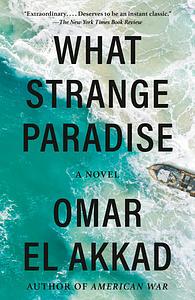Take a photo of a barcode or cover
adventurous
emotional
medium-paced
The concept was good, but I ended up glazing over for a lot of it.
A beautiful, sad novel about a Syrian migrant boy who, having survived a shipwreck on a Greek isle, is shielded from the authorities by a local girl. El Akkad skillfully conveys the human side of migration, from the desperate individuals gambling with their lives on rickety ships to the European soldier tasked with apprehending them. The contrast between wealthy tourists vacationing on the island and the starving, desperate migrant boy is meant to evoke our shame — how we fail to see these people as humans.
What Strange Paradise isn't just tragedy, though. It's funny and incisive in parts, especially those scenes on the migrant ship where dozens of strangers co-exist uneasily. But most importantly, like all good fiction, it brings to life a story that all too many of us prefer not exist.
What Strange Paradise isn't just tragedy, though. It's funny and incisive in parts, especially those scenes on the migrant ship where dozens of strangers co-exist uneasily. But most importantly, like all good fiction, it brings to life a story that all too many of us prefer not exist.
challenging
emotional
informative
sad
medium-paced
Plot or Character Driven:
A mix
Strong character development:
Yes
Loveable characters:
Yes
Diverse cast of characters:
Yes
Flaws of characters a main focus:
No
challenging
reflective
sad
tense
medium-paced
Plot or Character Driven:
Plot
Strong character development:
Complicated
Loveable characters:
Yes
Diverse cast of characters:
Yes
Flaws of characters a main focus:
No
challenging
dark
hopeful
tense
fast-paced
Strong character development:
Yes
adventurous
dark
emotional
inspiring
sad
fast-paced
Plot or Character Driven:
A mix
Strong character development:
Yes
Loveable characters:
Complicated
Diverse cast of characters:
Yes
Flaws of characters a main focus:
Complicated
challenging
dark
emotional
medium-paced
Plot or Character Driven:
A mix
Strong character development:
Yes
Loveable characters:
Yes
Diverse cast of characters:
Yes
Flaws of characters a main focus:
No
challenging
emotional
sad
tense
fast-paced
Plot or Character Driven:
Plot
Strong character development:
Complicated
Loveable characters:
Complicated
Diverse cast of characters:
Complicated
Flaws of characters a main focus:
No
I wanted to share a few quotes that struck me, though countless other sentences were perfect and read over and over.
But the two kinds of people in this world aren't good and bad- they're engines and fuel. Go ahead, change your country, change your name, change your accent, pull the skin right off your bones, but in their eyes they will always be engines and you will always, always be fuel.
... you are to them in the end nothing but a hook on which to hang the best possible image of themselves.
This book was recommended by my good friend Erin, who told me to enter without looking too much into it. It's a refugee story and it's heartbreaking. Written beautifully, this book tugs at the heart of the reader who can't crack out of the expertly described scenes El Akkad pulls together. From the places Amir stays before he gets on the boat to the island of opposites, I felt rooted in the story from the first chapter.
What I found super clever, as per the quotes above, was the way that El Akkad weaves in reflections on the way this world works, the way that our system allows this cycle to continue, and the views that wash around in the heads of those involved or not. He includes snips from a TV interview with a right wing politician, juxtaposing Amir's story with the assumptions that allow such people to vilify migrants. He gives the men on the boat and the colonel the chance to speak their minds so bluntly, and often the things they share cut right to the heart of the reality here.
When I left England, they were calling it 'the small boats crisis' and it's so easy for the news to paint a situation in a way which wipes over the individual stories and journeys of the people on these boats. Every now and again, the colonel is right, the media would pick up a child and everyone would be outraged for 5 minutes, virtue signalling to their hearts' content. This book made me feel exposed, it made so many of the pillars on which we stand here in the US, and back in the UK, clear: privilege on the backs of those elsewhere. It made me reflect, as I am sure I will continue to, on whether there is more I can do.
I found the fact the character of Vanna compelling, especially with her decision at the end of the story. The end of the book kicked me in the gut, though I won't say more than that.
What a fantastic, poignant read which refocused my mind back into a dark underbelly of our world and the harsh realities which face many people.
emotional
sad
tense
fast-paced
Plot or Character Driven:
Plot
Strong character development:
No
Loveable characters:
Complicated
Diverse cast of characters:
Yes
Flaws of characters a main focus:
No
Very moving and a very sober book in general - I certainly wouldn't say it's an enjoyable read by nature of the subject matter, but it was an arresting story of a young Syrian refugee and a depiction of the racism and xenophobia that pollutes privileged, colonial "Western" societies.
I didn't love the writing style; there were so many "a [adjective] thing,"s so many commas followed by phrases, and so many purpley sentences that seemed trying to evoke a "literary" style without using language in a particularly elegant way. But this is me being a style hater.
The larger issue I had - perhaps one influenced by El Akkad's journalism background - was how visible the mechanics of emotion felt. Reading often felt like playing a card game with a friend who already knows all your tricks and tells and keeps raising an eyebrow whenever you fall for a predictable trap. I can’t fault the book for lacking realism, because people do indeed say and do every infuriating thing in the novel, but something about how the story was structured felt too openly contrived. Like yes, if you show people being racistly ignorant and then immediately juxtapose that with the sorrowing conditions of the migrants on the boat, I'll get mad. Maybe it's too much to assume that the average reader also feels human empathy, but the story almost seemed to end with the conclusion that people are xenophobic shitbags rather than imagine what difficult paths might lead out of that reality.
The ending . . . I'm not sure I'm in the camp of people who thinks it's immensely powerful TT it's mostly the lingering skepticism of "it was all a dream" endings, but it didn't seem like a catchout so much as a " . . . well what is this point with this" for me.
I didn't love the writing style; there were so many "a [adjective] thing,"s so many commas followed by phrases, and so many purpley sentences that seemed trying to evoke a "literary" style without using language in a particularly elegant way. But this is me being a style hater.
The larger issue I had - perhaps one influenced by El Akkad's journalism background - was how visible the mechanics of emotion felt. Reading often felt like playing a card game with a friend who already knows all your tricks and tells and keeps raising an eyebrow whenever you fall for a predictable trap. I can’t fault the book for lacking realism, because people do indeed say and do every infuriating thing in the novel, but something about how the story was structured felt too openly contrived. Like yes, if you show people being racistly ignorant and then immediately juxtapose that with the sorrowing conditions of the migrants on the boat, I'll get mad. Maybe it's too much to assume that the average reader also feels human empathy, but the story almost seemed to end with the conclusion that people are xenophobic shitbags rather than imagine what difficult paths might lead out of that reality.




